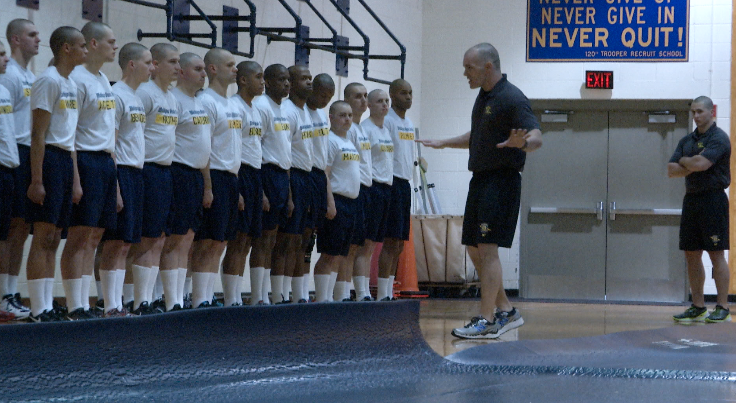A Day in the Life of a Michigan State Police Trooper Recruit
- Published: 4/6/2016
- Comments
LANSING - "Wake up five o'clock in the morning," recruit Dijon Ware said.
Seventeen-hour week days, for 22 weeks.
"The Michigan State Police 129th Trooper Recruit School started on March 27th, 2016 and it started with 60 recruits And this is one of the most diverse recruit school in state police history," Sergeant Dwayne Gill said.
Based on military training, the school is a very specific and tough process.
"Our academy is para military and so we will instruct them in marching and how to keep their military demeanor, whether they're squaring corners or saluting in their chain of command," Trooper Tedric Gibbs said. "A lot of their training goes into the MSP history as well in the beginning. We want them to have a firm foundation of the department that they've chosen to come in. As well first aid, throughout the school, but first aid, firearms, and obviously physical training, that starts their day and tries to prepare their mindset for the day."
There's no room for half-wake, it's up and running, almost literally.
"We have a few minutes, brush your teeth, shave, get your rooms ready, your beds made up," Ware said. "We report to PT 5:30 in the morning."
The once-60, now-55 recruits line up on the ramp and run into the gym, jogging in place as they get to their mats.
The foamy, blue mats are lined up tightly, with just enough room on both sides for the exercises.
Each exercise has its own spot on or around the mat, and if it isn't performed correctly, it's back to push-ups for everyone.
"Constantly being monitored, you know. Can't walk anywhere, do anything by yourself. Someone's always watching you," recruit Jessica Davis said.
Physical training exercises include push-ups, squats, lunges, elbow planks, leg lifts, running around the station, sit-ups and more.
As the Trooper who is the PT instructor for the day says "one," recruits hold the exercise, for example holding the pushup, squat or lunch in the down position.
When the instructor says "two," they go up.
"A lot of the times they get uncomfortable in the physical training, where you get swat coming down your eyes and they want to wipe their face off," Gill said. "You don't have that kind of time if you're out on the street in some kind of fight."
Physical Training goes until 6:45 a.m., when the recruits are released to go shower and change.
At 7 a.m., they line up on the stairwell and march to breakfast.
"We pretty much have half an hour, 20 minutes, not really, but by the time kitchen detail is done we should be out of the cafeteria (at) about 7:25, so pretty much only have about 10 to 15 minutes to eat," Ware said. "So you're pretty much just scarfing things down, drinking and stuff."
After breakfast, the recruits have inspection, which is where Troopers look at uniforms, rooms and ask questions.
"The main thing here is pay attention to detail, so everything is right on, spot on, line up same spot, same order," Ware said.
Recruits line up in front, but facing away from, the walls by their rooms, with each roommate on each side of the door.
As Troopers approach, recruits bring their elbows to 90 degrees, and have their hands out, palms facing down.
As sweat droops down the recruits' foreheads, a Trooper asks him or her to step forward, where the first will inspect the uniform and see if everything is clean and in place.
Troopers will ask them to step back, look at fingernails, shaved face, everything, as they ask questions about anything.
Since this is week four, some Troopers will ask what the recruits had for breakfast or where their roommates are from, but with the same seriousness as the Troopers who ask captains of districts or laws.
"They're just starting to settle in," Gibbs said. "Usually around week 5, week 6 their bodies are starting to get used to the training, their bodies are starting to get used to the hours that they're up. In the beginning it is tough on them, it is an adjustment for them to go to bed at 10 o'clock and then be ready to go at five a.m."
In time, the questions will become more important and serious.
"So we're constantly challenging them physically and mentally," Gibbs said.
If the recruits get the question wrong, they will be written up.
"When we're released from inspection we have class from eight to 12, either law class, first aid class, or either we're in squads broken down doing DT (Defensive Tactics), firearms, water safety, stuff like that," Ware said.
On the day of the visit, troopers were divided in squad A and B.
One went to Defensive Tactics and the other to firearms.
"It's being there physically and mentally at the same time, ready to learn and not just, not just do," recruit Gordon Sandula said.
In DT, recruits line up in the back of the gym, when another quick inspection, of how quick and tidy they are, happens.
"Defensive tactics I do like," Davis said. "Once we get past the exercise portion of it and hanging down the bars and that, we do different takedowns and different techniques that are really really good, so I really enjoy that too."
If recruits do it wrong, they are asked to line up in their locker rooms once more and do it again.
At that point, there is another round of exercise.
Half of the group runs, while the other half does pull-ups on the bars.
The bars have a rough black tape around them, that leave marks on the hands of people who aren't used to them.
Some recruits let go from the bar before time is up.
The Trooper in charge of DT makes them line up in two rows facing each other and put their arms straight out to their sides, where they hold it for what seemed like a long period of time.
In between having their arms up and being lectured to not give up, recruits did pushups.
The Trooper leading DT yelled that the recruits cannot give up in training, because they won't have the luxury to give up in real life.
It might cost them their lives.
The Trooper yells that he doesn't want to be the one going to the recruits' families and explaining that they "gave the ultimate sacrifice" because they gave up during a fight.
After the round of exercise and lecture, some defensive-move sequences are taught and the recruits practice it for another two or so hours.
The other squad is up at the range in firearms training.
In Firearms, the recruits lineup in front of a target, with their guns loaded.
The instructor ask from outside of the range: "Is the line ready?" to which he answers and announces, "The line is ready."
Recruits pull out the guns and fire two rounds at the target.
Gibbs said that the troopers and instructors try to maintain a more relaxed atmosphere at Firearms and outdoor car training, because those are pressure high situations that can put the recruits and troopers at risk even in training.
Different than DT, Firearms instructors can be heard saying "good job" and giving tips in a much friendlier manner.
"Twelve o'clock, lunch," Ware said.
Lunch is the same as breakfast, Ware said.
Recruits have to eat in about a half hour and have another half hour to be ready for the afternoon activities.
"Afternoon class usually lasts from one to five," Ware said.
Five p.m. is dinner.
"Then you have time to study shine your shoes, unless there's other stuff coming on," Ware said. "Sometimes there's remedial training, water safety training, other training like that."
At 9:45 p.m., recruits take off their utilities, shower, and get ready for bed.
Lights are out at 10 p.m.
"It's one of the most difficult things I've every faced in my life, but there's a reason why it has to be done this way," Davis said. "Because when you become a captain or a lieutenant you'll understand, the safety. You know, you wanna make sure you're safe, you wanna make sure the public's safe. You can't do that if you're relaxed all the time, doing whatever you want."
Some things that are naturally normal to do, aren't allowed.
"For the normal public it's natural to touch your face, something's bothering your eye you know you go or you move your hair, you do something like that," Davis said. "It's natural reflex almost. You can't do any of that here, you know. Not speaking, when you speak to someone."
Despite the mental and physical challenges, most recruits understand why things are how they are.
"We're all here trying to be the best we can be to serve the community," Sandula said.


 Spanish
Spanish Chinese (Simplified)
Chinese (Simplified) Korean
Korean French
French German
German Hindi
Hindi Urdu
Urdu Japenese
Japenese Arabic
Arabic Russian
Russian Farsi
Farsi
